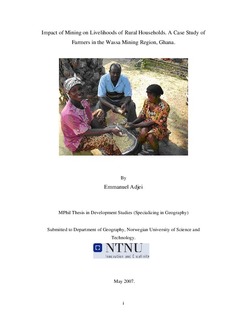| dc.description.abstract | Radical reforms and liberalization in the mining sector of the Ghanaian economy stimulated increase in mining sector investment with new multinational mining companies coming on board as well as the rehabilitation of old mines. The cumulative effect was the intensification of mining and the expansion in the operation of mines across the mining zones in the country. Livelihoods of households in the rural communities in the catchments of the mines got threatened by the expansion of concessions to the mining companies. These concessions covered lands on which rural households engage their farming activities for a living. The immediate repercussion has been the taking over of farmlands by the mines, a process, which affects livelihoods in its entirety. This study examines the impact, both positive and negative, that this phenomenon has had on the livelihoods of these rural households. It further sought to identify the ways those farmers, who were negatively affected by the operations of the mines cope. It looks at the context in which these poor rural households pursue their livelihoods, and discusses the factors, which make their livelihoods vulnerable. The forms of capitals, named livelihood assets, available to the rural households are examined from the effects of transforming structures and processes. The livelihood outcomes of the farmers from the strategies and the coping measures are then identified and discussed. The study found out that there are both positive and negative outcomes to the rural households following the operations of mines in the communities. The expansion of mines’ concessions, though led to claim of lands from farmers, was accompanied by compensations, which enabled some of the affected farmers obtain alternative lands for farming in addition to creating the opportunity for engaging in other livelihood activities. This sustains livelihoods through more income. On the other hand, the claim of land from the farmers leads to high rent and unfavorable land tenure faced by the farmers as there is shortage of land for farming. The direct consequences of these are the reduction in farming activities and low food production. This in conjunction with chemical pollution of soils, and the accompanying low yields results in high cost of living. | nb_NO |
